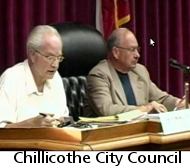8/20/2009
Ohio City Attempts to Undermine Traffic Camera ReferendumChillicothe, Ohio attempts to undermine November referendum on the use of photo enforcement.

Activists in Chillicothe, Ohio vowed on Monday to fight efforts to sabotage a referendum on the use of traffic cameras. Residents signed a petition demanding the right to have a vote in November on whether to keep or outlaw red light cameras and speed cameras. Once on the ballot, no referendum of this type has ever failed to pass, and Chillicothe officials are doing what it takes to ensure that never happens. Assistant Law Director James L. Mann on Friday filed a formal petition with the Ross County Board of Elections seeking to block the petition.
"The city of Chillicothe... protests against the petition for the initiative petition for the reason that portions of the petition violate existing state law, portions of the petition violate the Ohio and United States Constitution and the petition is confusing and misleading to the voting public," Mann wrote.
Mann argued that the petition is unlawful because, he claimed, a city may not by initiative bind the actions of county law enforcement. He also claimed that citizens may not "impair" the existing contract between Redflex, the private Australian company that actually operates every aspect of the program from installing cameras to mailing citations, and Chillicothe. Mann insisted that citizens of Chillicothe have no power to bind the future actions of the city council. In effect, he said that the council decision was beyond the power of citizens to correct.
"The actions of the council of the city of Chillicothe in enacting Ordinance 151-07 and Chapter 315 of the Codified Ordinances were administrative and not legislative," Mann wrote. "Therefore those actions are not subject to initiative proceedings."
Rebekah Valentich, leader of the group Citizens Against Photo Enforcement, insisted that Mann's arguments were without merit. Since the mid-Nineties, five cities -- including two in Ohio -- have used the initiative process to overturn photo enforcement programs. Not one of these efforts was sidelined by legal, contractual or constitutional challenges of the type cited by Mann. Valentich says her group has followed the letter and spirit of the law.
"CAPE has collected valid signatures; the board of elections has certified the petitions and forwarded them to the secretary of state, where the wording has been approved for the ballot and have returned them to the board of elections," Valentich said in a statement. "Now the city of Chillicothe has come forward protesting the petition, with a last ditch effort to take the voice away from the people."
At least three other referendum efforts are scheduled for November's ballot. Most recently, activists in Toledo, Ohio confirmed that they had secured the requisite number of signatures, as has the city of Heath. In College Station, Texas, officials this week backed down on an earlier effort to undermine the photo enforcement ballot initiative. Valentich said she is willing to go the distance to ensure citizens have the final word on automated ticketing machines.
"We are not going to back down from those bullies," Valentich said. "They can threaten all they want, but until the fat lady sings, the game is not over. As of now, it is still going on the ballot. If the board of elections agree with the city, than it will go to the supreme court."
The mayor and city council members from Chillicothe ignored requests to comment for this story. A copy of the ballot initiative and Mann's letter are available in a 250k PDF file at the source link below.


